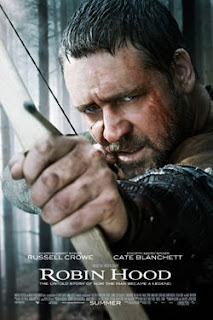Robin Hood
 I think it's important than anyone reviewing a film should review the film they see, not the one they expect or want to see. But with Ridley Scott's version of Robin Hood it's a bit tough. The film doesn't have a swatch of Lincoln green to be seen, no feathered hats, no archery contests, no talk of stealing from the rich and giving to the poor. The hero has no glint in his eye, and the merry men aren't all that merry.
I think it's important than anyone reviewing a film should review the film they see, not the one they expect or want to see. But with Ridley Scott's version of Robin Hood it's a bit tough. The film doesn't have a swatch of Lincoln green to be seen, no feathered hats, no archery contests, no talk of stealing from the rich and giving to the poor. The hero has no glint in his eye, and the merry men aren't all that merry.What Scott has made is a serviceable historical action picture, with clashing swords, thundering hoofbeats, snarling villains, bodacious wenches, and palace intrigue. It just doesn't keep with with the centuries of incarnations of the gallant hero from medieval English ballads. It's as if the film needed a big name to be made and sold, and that big name was Robin Hood.
In this tale, our hero, Robin Longstride, is an archer with Richard the Lionheart's army as it plunders its way back from the third Crusade (most of the Robin Hood stories have him doing his Sherwood Forest thing while Richard is away). The king, played memorably by Danny Huston, as if he had just recently watched Anthony Hopkins' performance as the same man in Lion in Winter, ends up dead from an arrow (this is close to the way he really died, but the truth is more interesting, as he ended up pardoning the young man who shot him). The bad guy, a nobleman called Godfrey, has made a deal with the French king to make sure the weak John ends up on the throne, thereby softening the land up for invasion. Robin, impersonating a dead knight, returns the crown to Richard's mother, Eleanor of Aquitaine, and then ends up in Nottingham to return the knight's sword to his father. I realize as I type this that it was all pretty complicated, and I think needlessly so.
While in Nottingham Robin has eyes for the knight's widow, Marian (no maid she in this version). He and an ousted chancellor (William Hurt, in a WTF is he doing in this movie performance) figure out Godfrey's treachery and try to convince the king to unite with barons, who are pissed over high taxes, to stave off the French invasion. Someone writes up a first draft of the Magna Carta, and there's a big battle on the coast, and afterward Robin and his cohorts take to the woods as outlaws, and we're told the "legend begins."
This is moderately interesting and entertaining, but throughout I just couldn't get fully engaged. Russell Crowe is not my idea of Robin Hood. For one thing, he's too old to be playing the guy in an origin story. Sean Connery, who played Robin Hood in retirement in Robin and Marian, was the same age Crowe is now (46). For another, Crowe has always represented the kind of hero that crashes through walls and leads with his forehead, while to me Robin Hood is a dashing, swashbuckling fellow, nimble of feet and quick with a quip. But again, that's my preconception. It's not as if we know what Robin Hood was really like, if he existed at all.
While I grant Scott his artistic license, that doesn't mean I have to like it. I would have liked more Merry Men. As they exist here, there's not much to distinguish them, and Robin and Little John don't meet with a fight on a log bridge, they squabble over a shell game. Only Friar Tuck (Mark Addy) seems consistent with past versions. The Sheriff of Nottingham, usually Robin's foil, is here given short shrift, though played by an actor (Matthew Mcfadyen) of some note. Instead the villain is Godfrey, and he's embodied by Mark Strong, who I've now seen figuratively twirl his mustache in three films (Sherlock Holmes and Kick-Ass are the other two) in the last few months. Oscar Isaac gives a one-note performance as King John, who isn't helped by the writing, while Eileen Atkins, a fine actress, has to play Eleanor. After Katharine Hepburn played her in Lion in Winter, that can't be an enviable task.
As for Crowe, though he may be miscast, he brings star appeal to the role, though I couldn't understand many of his lines through his accent. It was a pleasure to watch Cate Blanchett as the feisty Marian (after Elizabeth: The Golden Age, she's specializing in women who like to don battle armor), and Max Von Sydow steals his scene's as Nottingham's local baron, though I would hate to try to figure out exactly what kind of accent he's using. Maybe he's left over from the Viking invasions.
Robin Hood is a grim film, full of the harshness of medieval life, with lots of bad teeth, dirty fingernails and septic wounds. This may be historically accurate, but when this film is inevitably remade again in another generation I'd love to see a return to the jocularity of earlier versions. That's just not Ridley Scott's bag, though. Looking over his filmography, there's nary a sign of a light touch.


Comments
Post a Comment